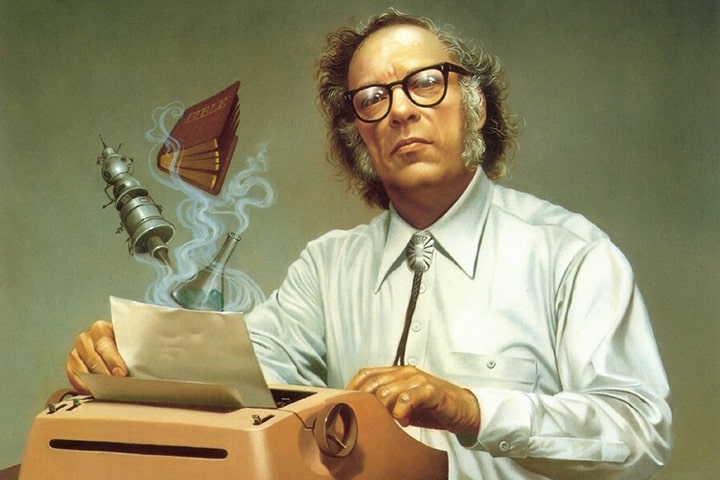Безсмертний бард
— О, так, — сказав доктор Фінеас Велч. — Я можу викликати душі знаменитих
покійників.
Він був злегка напідпитку, інакше б цього не сказав. Звісно, це було абсолютно
нормально: трохи перебрати на різдвяній вечірці.
Скот Робертсон, молодий викладач англійської мови і літератури, поставив свій
бокал на стіл і перевірив, чи їх бува ніхто не підслуховує.
— Справді, докторе Велч?
— Тобто, я хочу сказати, не тільки душі. Я також можу викликати тіла.
— Не думаю, що це можливо, — стримано відповів Робертсон.
— А чому ні? Просте переміщення в часі.
— Ви маєте на увазі подорожі в часі? Але це вкрай незвично.
— Це дуже легко, якщо знаєш, що робити.
— Тоді, докторе, розкажіть, як ви це робите?
— Гадаєте, я вам розповім? — серйозно спитав фізик. Він повільно роззирнувся в
пошуках випивки і нічого не знайшовши продовжив. — Я вже переносив деяких. Архімед, Нютон, Галілей. Бідні хлопці.
— Хіба їм у нас не сподобалося? Я гадав, що сучасна наука мала б їх вразити, — промовив Робертсон. Розмова починала йому подобатися.
— Повірте, вона їх таки вразила. Справді вразила. Особливо Архімеда. Я спершу думав, що він просто збожеволіє від радощів, коли я йому пояснив що до чого, тою старогрецькою, яку мені колись доводилось зубрити, але...
— Щось пішло не так?
— Різні культури, ось і все. Вони не могли призвичаїтися до нашого способу життя. Почували себе страшенно самотніми і наляканими. Я мусив відправити їх назад.
— Так шкода.
— Що є, то є. Уми великі, а от пристосовуються погано. Не універсальні. Тож я спробував перенести Шекспіра.
— Що? — вражено вигукнув Робертсон. Це вже стосувалося його спеціальності.
— Не треба так кричати, юначе, — скривився Велч. — Це дуже неввічливо.
— Я вас правильно зрозумів, ви перенесли в наш час Шекспіра?
— Так, переніс. Мені був потрібен хтось з універсальним розумом, хтось хто знав
людей достатньо добре, щоб жити разом з ними на відстані в кілька століть від власного часу. Шекспір був такою людиною. Я навіть маю його автограф. На згадку так би мовити.
— Автограф? — в очах Робертсона затанцювали безумні вогники.
— Він у мене з собою, — Велч почав перевіряти одна за одною свої кишені. — А, ось і він.
Він простягнув маленький клаптик картону викладачу англійської мови і літератури. На одному його боці було: "Л. Кляйн & сини. Металеві вироби оптом". А на звороті розмашистим почерком було написано: "Вільям Шекспір".
У Робертсона виникло божевільне припущення.
— Який він був з себе?
— Зовсім не такий, як на картинах. Лисий з потворними вусами. Говорив з якимось
дивним акцентом. Я, звичайно, зробив усе, аби йому сподобалося в нашому часі. Я розповів йому, що ми дуже високої думки про його п'єси і ми досі ставимо їх на сцені. Я сказав, що ми вважаємо їх найвеличнішими творами не тільки англійської, а й світової літератури.
— Правильно. Правильно, — слухав Робертсон, затамувавши подих.
— Я сказав, що люди написали цілі томи коментарів до його п'єс. Природно він захотів ознайомитися з ними, тож я взяв дещо з нашої бібліотеки.
— І?
— О, він був вражений. Звісно, йому було важко зрозуміти ідіоми та алюзії, що відносять нас до подій після 1600, але я допоміг йому. Бідолаха. Не думаю, що він очікував на подібний прийом. Він все примовляв: "Боже помагай. Так мордувати слова останні 5 століть. Мислю, що ви і з вологого рядна цілий потоп вижмете".
— Він не міг так казати.
— Це ж чому? Він писав свої п'єси так швидко, як тільки міг. За його словами, все доводилося робити в дуже стислі терміни. Він написав Гамлета менше ніж за 6 місяців. Історія була давньою. Він лише трохи її відшліфував.
— Так само роблять дзеркало для телескопа. Трохи шліфують та й по всьому, — обурився викладач англійської мови та літератури.
Фізик не звернув на нього уваги. Він запримітив свіжий коктейль в кількох футах від себе і почав боком рухатися до нього.
— Я сказав безсмертному барду, що у нас є навіть університетські курси по Шекспіру.
— Я якраз читаю такий.
— Знаю. Я записав його на ваші вечірні лекції. Ніколи не бачив людину, яка б настільки палко хотіла дізнатися, що думають про неї нащадки, як нещасний Білл. Він гарно над цим попрацював.
— Ви записали Вільяма Шекспіра на мої курси? — пробурмотів Робертсон. Навіть, якщо це п'яні базікання, все одно голова йде обертом. Але чи справді це були просто п'яні базікання? Він починав пригадувати лисого чоловічка з дуже дивною манерою розмовляти.
— Я, звісно, записав його під вигаданим ім'ям. — промовив доктор Велч. — Що б там не було, він щез. Це все було помилкою. Дуже великою помилкою. Бідолаха.
Він нарешті взяв собі коктейль і затряс над ним головою.
— Яка помилка? Що трапилося?
— Я відправив його назад у 1600 рік, — обурено проревів Велч. — Скільки по- вашому принижень може витримати людина?
— Про які приниження ви говорите? Доктор Велч залпом випив свій коктейль. — Простачок, ви його завалили.

